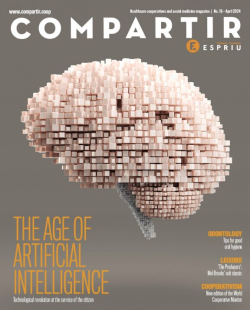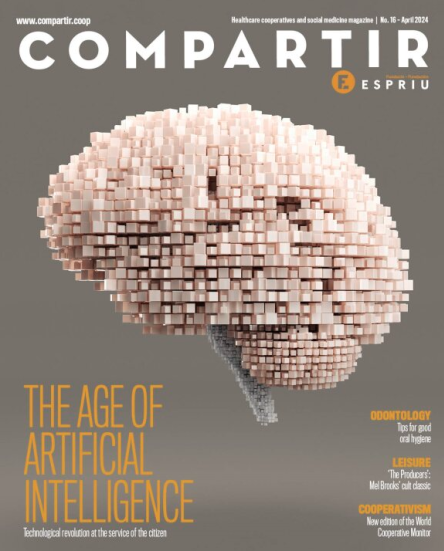
Beyond memory loss
Vascular dementia is a disorder that is triggered when the blood circulation to the brain is reduced and it affects 1.6% of patients over the age of 65 years. It is the second most frequent diagnosis of dementia after Alzheimer’s disease and it can be developed on its own or alongside another form of dementia.
Vascular dementia is a “cognitive deterioration that appears in patients who have had cerebrovascular diseases such as a stroke or brain haemorrhages, producing a loss of mental faculties,” explains Doctor Elena Elvira, a neurologist from HLA Vistahermosa. That is to say, it is caused by a series of small cerebrovascular accidents over a long period of time. The doctor adds that at times, the same person can develop a mixed dementia, for example due to Alzheimer’s disease added to vascular dementia. There are several causes of this neurodegenerative pathology. On the one hand, Elvira explains, “brain damage is produced by an ischemia and by anoxia (lack of oxygen),” but other factors also have an influence, such as high blood pressure over many years, particularly if it has not been controlled properly, smoking, obesity, consumption of toxics substances or diabetes. The healthier a person is, the more favourable their dementia prognosis will be. And, amongst the risk factors age must not be forgotten. As the population gets older, these diseases become more common, “both due to the ageing of the blood vessels and to the greater presence of cardiovascular and stroke risk factors,” she indicates.
High blood pressure, problems with heart rhythm, having diabetes or high cholesterol levels can increase the risk of experiencing cognitive deterioration and suffering from vascular dementia.Patients with vascular dementia suffer from a cognitive deterioration which, in the initial phases, usually starts as a “difficulty in planning, concentration, attention, ideational slowness and some apathy” the doctor analyses. They may have problems with language when trying to find the correct word or find difficulties in following instructions. This is what is known as cognitive deterioration of the “dysexecutive or fronto-subcortical” profile, which is very different to the initial pattern, for example, of Alzheimer, where the first faults usually affect recent memory. However, with the progression of vascular dementia the “working memory, verbal fluency and even walking and learning” can become increasingly affected,” Elvira indicates. That is to say, the deterioration in the intellectual capacity derived from the dementia irrevocably affects the patient’s social functioning and daily life.
To make a diagnosis of this pathology a clinical interview is carried out, along with a neurological examination and a cognitive evaluation. Additionally, analyses and brain imaging tests are necessary, such as a computerised axial tomography scan (CAT). In recent years, thanks to new tests significant advances have been made in the diagnosis of this type of dementia, a primordial aspect when treatment needs to be started soon as possible and that will concentrate on preventing future cerebrovascular accidents. This treatment, either using drugs or physical and cognitive rehabilitating therapies must be individualised. If not, as the doctor comments, there is a risk of “the appearance of new strokes or new cerebrovascular lesions”. She also explains that in patients where the appearance of new neuronal damage is not controlled, “the prognosis is worse than in those where we manage to slow down the cerebrovascular damage. There is no definitive cure for vascular dementia, “but we can try to control certain symptoms that can arise throughout the disease. On this point, it is vital for the patient “to trust us and that we are accessible.”
How to prevent vascular dementia
The best possible prevention is to lead a healthy lifestyle that helps to reduce the cerebrovascular risk factors. It is very important to emphasise the control of blood pressure, hypercholesterolemia or diabetes in the elderly. Accordingly, maintaining blood pressure at normal levels helps to prevent both vascular dementia and other neurodegenerative diseases. Today, there are many devices to measure blood pressure and heart rate, either in an outpatients unit or at home. They are devices that “can detect high blood pressure and arrhythmias that had not previously been diagnosed,” and this allows, using prevention, “a reduction in the risk of cognitive deterioration being developed,” Doctor Elena Elvira indicates. Additionally, the neurologist recalls, it is essential to abandon toxic habits that are harmful to health such as drinking alcohol and smoking. “And to apply prevention treatments for heart arrhythmias that have been related to the appearance of strokes.” Finally, moderate physical exercise on a daily basis and the Mediterranean diet are great allies for maintaining good health. Therefore, a diet that includes many vegetables, fruit and wholegrain cereals provides the necessary amount of antioxidants needed by the organism to counteract the effect of the free radicals on the neurons.
Dr. Elena Elvira
Doctor Elena Elvira forms part of the medical team at the Neurology Unit at HLA Vistahermosa, where priority is given to the good treatment of patients and the tackling of a correct diagnosis-therapy for all patients with neurological diseases. She was trained as a neurologist at the Hospital General Universitario de Alicante and she specialised in the San Vicente Dementias Unit, a reference centre for this type of mental disease in the province of Alicante.





